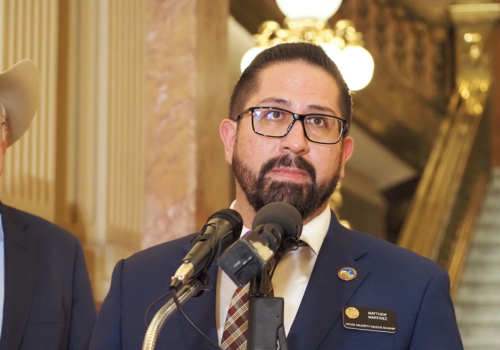
The Colorado House of Representatives has approved a bill aimed at regulating the expansion of a large fence in the San Luis Valley, which locals argue disrupts wildlife and infringes on their historic land access rights.
House Bill 25-1023 passed with a 45-19 vote, largely along party lines. Republican Reps. Carlos Barron, Matt Soper, and Rick Taggard joined Democrats in supporting the measure.
“This is not just a private property rights issue, but the land grantees also have rights associated with this,” said bill sponsor Rep. Matthew Martinez, a Democrat from Monte Vista. “The counties have tried to get their hands wrapped around this and have been unsuccessful, so that’s why we’re bringing this bill forward.”

The legislation, co-sponsored by Assistant Majority Leader Jennifer Bacon, would require landowners to apply for local government approval before building fences at least five feet high and one mile long on Sangre de Cristo Land Grant properties. The bill is primarily focused on Costilla County and aims to halt construction of an 8-foot-tall fence on Cielo Vista Ranch, which spans over 20 miles.
“Wildlife herds are being separated and trapped in and outside of the property because of how high the fence is,” Martinez said. “There’s erosion that’s causing new flood plains, sediment deposits in irrigation ditches, and flooding out houses of locals.”
The ranch, historically known as La Sierra, holds communal land-use rights for descendants of Mexican settlers, including grazing, hunting, and religious practices. Courts have recognized these rights through an easement.
Ranch owner William Harrison, a Texas billionaire, has defended the fence as necessary to prevent trespassing and contain his bison herd. Some locals have been given keys to access the land through certain gates.
However, retired physician Joseph Quintana described the fence construction as a “four-year nightmare.”
“I am witness to the changing wildlife migration patterns, as the fence now forces animals to cross through my property to access water,” Quintana said. “The community is horrified and heartbroken by what the fence is doing to the wildlife.”
Attorney General Phil Weiser testified in favor of the bill, comparing the fence to a “wire grid” similar to a prison barrier. “This bill is not about limiting property rights for quiet enjoyment, for what is true private property,” he said. “This is a different sort of situation, and it is about how different groups can live together in harmony.”
If passed, the bill would take effect on July 1 but would not apply retroactively to existing portions of the fence. The measure now moves to the Senate, where it is sponsored by Sen. Cleave Simpson, a Republican from Alamosa, and Sen. Julie Gonzales, a Democrat from Denver.